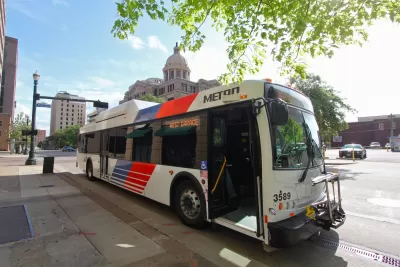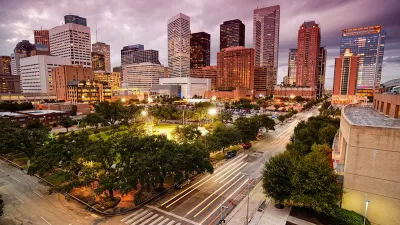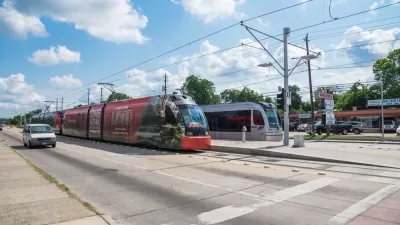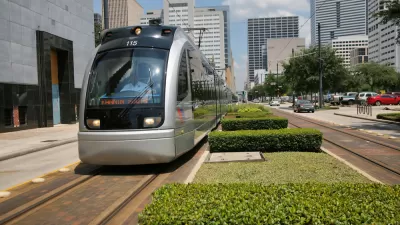The Moving Forward Plan seeks to improve transportation throughout the region, but funding and project priorities still need to be sorted out.

Dug Begley takes a closer look at the Metropolitan Transit Authority’s METRONext Moving Forward Plan that includes a series of bus, rail, and roadway projects. The plan outlines light rail extensions, proposed bus rapid transit routes, increased commuter and local bus service, and new high-occupancy vehicle lanes and park-and-ride facilities.
Begley says that projects are planned throughout Metro’s 1,200-square-mile service area to get more commuters using transit:
Inside the Sam Houston Tollway where buses travel most major streets and are more commonly used by residents, officials want to increase how often those buses come. Outside the beltway where more than 2 million of Harris County’s residents live, park and ride lots will be expanded and commuter buses will go to more places more often.
Critics, however, say that the plan does not do enough to provide transit service to growing job centers in the Houston area. They also point out that extending rail service to Hobby Airport should be less of a priority as these projects will be costly and will carry fewer riders than comparable BRT alternatives and other routes to more densely populated areas.
Funding for the $7.5 billion plan is still up in the air. About half of the money will come from federal sources, with the remainder coming mainly from sales tax revenue bonds. Metro has started conducting public meetings to get input and comments and expects to put the bond issue in front of voters in November.
FULL STORY: Metro plan’s mix of transit, services a nod to differing Houston-area demands

Maui's Vacation Rental Debate Turns Ugly
Verbal attacks, misinformation campaigns and fistfights plague a high-stakes debate to convert thousands of vacation rentals into long-term housing.

Planetizen Federal Action Tracker
A weekly monitor of how Trump’s orders and actions are impacting planners and planning in America.

In Urban Planning, AI Prompting Could be the New Design Thinking
Creativity has long been key to great urban design. What if we see AI as our new creative partner?

Baker Creek Pavilion: Blending Nature and Architecture in Knoxville
Knoxville’s urban wilderness planning initiative unveils the "Baker Creek Pavilion" to increase the city's access to green spaces.

Pedestrian Deaths Drop, Remain Twice as High as in 2009
Fatalities declined by 4 percent in 2024, but the U.S. is still nowhere close to ‘Vision Zero.’

King County Supportive Housing Program Offers Hope for Unhoused Residents
The county is taking a ‘Housing First’ approach that prioritizes getting people into housing, then offering wraparound supportive services.
Urban Design for Planners 1: Software Tools
This six-course series explores essential urban design concepts using open source software and equips planners with the tools they need to participate fully in the urban design process.
Planning for Universal Design
Learn the tools for implementing Universal Design in planning regulations.
planning NEXT
Appalachian Highlands Housing Partners
Mpact (founded as Rail~Volution)
City of Camden Redevelopment Agency
City of Astoria
City of Portland
City of Laramie





























